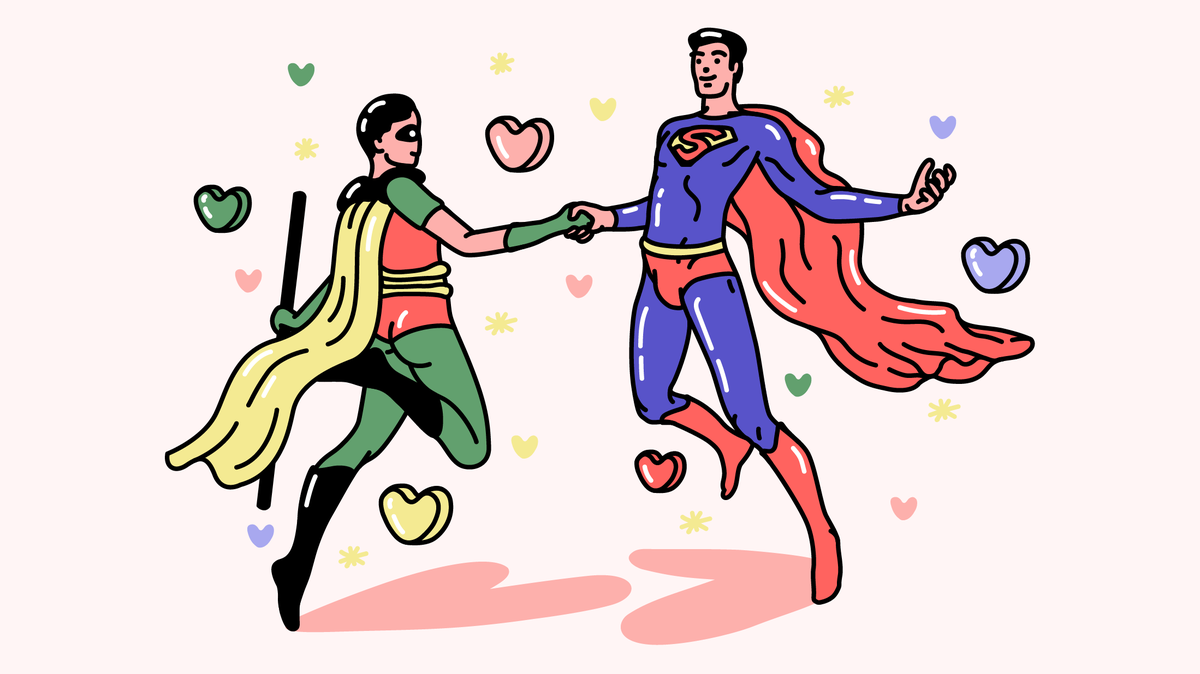Not a week goes by so that the excited discussion in the media and on social networks does not start only on the basis of a provocative headline. The last time this happened was the information that the comic book Superman would be bisexual from now on. Even in this case, however, it quickly became clear that the truth was elsewhere. In today’s Pod čarou, I therefore offer a short expedition into the world of contemporary comics and its calculating publishers.
–
Basic facts about the whole case already on described on our website Adam Ryšánek, so it is enough to summarize them briefly. In the upcoming fifth issue of the comics series Superman: Son of Kal-El published by DC Comics, the title character, the son of the original Superman Jonathan Kent, turns out to be bisexual and begins a relationship with a young reporter. The new workbook has not yet appeared on the shelves, but the world and Czech media have already used a clickbait headline to spin a case around which a discussion has erupted in the online space.
–
Here, too, you will find under the above-mentioned article hundreds of comments cursing about progressive novelties, the plot he did not hesitate to criticize also former Superman film director Dean Cain and one of the most bizarre reactions she came, God forever, also from a member of the PPF Board of Directors Vladimír Mlynář.
–
I don’t want to summarize the arguments why any fictional character of mainstream pop culture should be bisexual – if something special comes to you in 2021, then my newsletter will probably not bring you much joy in the future either. What is remarkable for me in the whole case is how little many journalists know about the content and economics of contemporary comics and popular culture in general.
–
Queerbaiting and obsolete superheroes
The background of the whole business is clearly revealed, for example, by the comic book critic Glen Weldon on the NPR website. He notes that although the two main comic book titans, Marvel and DC Comics, have increasingly included queer characters in their production in recent years, they are very careful to always be lesser-known members of their superhero stables. Any controversy and the associated risk of falling profits do not affect major stars such as Batman or the “original real” Superman.
–
The situation is similar with members of ethnic and religious minorities, who are again increasing mainly in supporting roles – in the discussed series from DC, we find, for example, an African-American adversary or the aforementioned friend Jonathan Kent, who is of Asian origin.
–
In the case of LGBT + characters, this practice is referred to as a term queerbaiting. Producers and authors try to be progressive, but at the same time not cause excessive conflicts. In their works, they often only suggest possible homosexual relationships and leave the rest to the imagination of fans, who often demand such allusions themselves – typical examples include the Sherlock series with Benedict Cumberbatch, the tension between the main protagonists of the series adaptation. Good Omens or striking statements by JK Rowling about the fact that Dumbledore is really gay.
–
However, the effort to get the wolf to eat and the goat to stay whole is seldom successful in the long run, and it is no different in the world of superheroes, which is now in vain catching up with long-missed opportunities.
–
Perhaps even greater controversy is raised by questions of ethnic and religious identity, and in 2013 the launch of a new series with the girl superhero Ms. caused a great debate. Marvel, who became Kamalou Khan, a Muslim teenager of Pakistani descent, in civilian life. What about being a screenwriter Gwendolyn Willow Wilson she tried to describe the life experience of young Muslim migrants in the USA and their generational conflicts with conservative parents quite sensitively and plastically – it was still an invasion of the still strongly masculine and white environment, and the critics did not wait long.
–
When we look at these storms from a distance, something is wrong. How do these things happen so often in the field of superhero comics, when in other areas of Western pop culture queer motives or minorities are already much more normalized? A global example is the highly successful Netflix Sex Education series.
–
The reason lies mainly in the little-known fact that American mainstream comics have been subject to relatively strict conservative censorship for more than half a century. In the United States, in the oppressive atmosphere of McCarthyism and anti-communist campaigns in the early 1950s, moral panic broke out over comics, which critics said had corrupted youth and promoted violence and sexual perversion. Publishers were therefore forced to establish a self-censorship professional organization Comics Code Authority (CCA). It set very strict rules, which in comics forbade, among other things, excessive violence, drugs, any manifestation of sexuality beyond chaste kisses, negative portrayals of the police and state authorities, but also the occurrence of zombies or werewolves.
–
Although these rules were loosened over the following decades and it was largely a formality since the 1990s, Marvel stopped officially applying the CCA label only in 2001 and DC Comics even in 2011 – only ten years ago. As in other similar cases of senseless censorship, this only led to the fact that, in addition to mainstream production, the scene of independent underground comics began to flourish in the USA in the 1960s, and official censored production became increasingly boring and detached from reality. When Marvel and DC finally woke up from limbo, they discovered that the world was long ago.
–
If teenage readers in the US and other parts of the world are already reading comics, they certainly do not focus on the current mainstream superhero work of the mentioned major publishers. With few notable exceptions, they have not brought many innovations in the field of comics in the last twenty years, and for both Marvel and DC, publishing comic books is only a marginal activity, complementing much more lucrative activities around film series and copyright extraction.
–
Just take a look at the discussed Son of Kal-El series. Although its screenwriter Tom Taylor tries to involve current motives such as climate catastrophes or persecution of refugees, the result is only a banal, moderately drawn and poorly written comic, the reading of which would soften the brain of every 17-year-old teenager (at least the title character Jonathan Kent) . That’s why young comic book readers have been for many years they devour the Japanese mango in large numbers, which has also long faced the limits of depicting sexuality, but queer motives have been present in it for much longer and its liveliness, humor and realism can hardly be competed by stale American superheroes.
–
The situation is similar with current Marvel film blockbusters. These are chaste as a religion lesson, but it only leads to their horny teen viewers publishing tens of thousands of fan fiction pages on Internet portals such as the legendary Archive of Our Own, in which erotic escapades in all conceivable combinations are undertaken by superheroes who would in the official canon, they didn’t even open the button on the costume.
–
History that did not happen
The case of the bisexual Superman is meaningless even if we take at the mercy of a superhero comic and uncritically assign him a role that he no longer has in Western pop culture. Many critics now claim that this is a nonsensical submission to progressive novelties, and the work should go back to the old golden days, when superheroes just fought super villains and did not deal with refugees or queer romances. As always in similar cases, this is a history that is completely flattered.
–
Imagine the reaction to the message “Superman’s girlfriend turns into a black woman to draw attention to the ubiquitous racism.” However, this scandalous succumbing to political correctness took place in 1970 in one of the episodes of the series Superman’s Girl Friend, Lois Lane. Perhaps even more so, Internet talkers would be struck by the headline “The creator of the new feminist superhero practices polyamory and proclaims the dominance of women.” But do it with yours Wonder Woman dopustil eccentric psychologist William Moulton Marston as early as 1941.
–
Despite conservative publishers and censorship, American comic book writers have always tried to transcend the boundaries of the possible and at least get a little closer to the lived reality of their teenage readers in their works. Therefore, already in the early 70’s, they consciously violated censorship rules and left some supporting characters drug overdose and queer figures began to be involved, at least marginally, in the 1990s at the latest.
–
It is similar with the reflection of current political events. It is the commentation of new burning topics that is the vital awakener for pop culture, and superhero comics have never avoided contemporary controversies. Superman in his first story fought miscarriages of justice and corruption in High Politics and Captain America at the cover of the first edition despite the fact that it was not written until 1940, the United States had a year to go to war, and a controversial move brought illustrators Kirby and Simon to street protests and police protection. I suspect that queer Superman betting a slacker to Putin or Bolsonar would provoke the same reactions today.
–
Last but not least, it is necessary to refute the mistaken assumption that the attractiveness of superhero comics lies in action scenes and a simple storyline, where sex and politics have nothing to do. The billion-dollar business made them mainly original motives of dual identity and superpowers. Thanks to them, every pushed teenager could suddenly dream of living a second secret life as a dazzling protector of the weak, and his existence suddenly did not look nearly as hopeless. It’s hard to find a better metaphor for learning about one’s sexuality and coming out, so if a young reader today reaches for the latest series from DC Comics and finds a character in it confirming his sexual identity, that’s a good thing, of course.
–
If you don’t want to succumb to unnecessary hysteria and artificial cases, try reading comics instead of sensational headlines, especially from other genres and regions outside the distinctive scene of American superheroes. And if you have teens, be interested in what they actually read. Then you will not be so easily subject to conservative manipulators who are trying to revive long-lost battles, or to hypocritical corporate publishers who will never put progress ahead of profits.
–
It’s great that DC Comics has introduced this new character, but we won’t be able to fully believe his good intentions until the real Superman and Batman bite into each other on a poster of the latest global movie hit in a passionate kiss. Not because it would be controversial and provocative, but on the contrary, because it is already quite common and normal in other spheres of culture and society.
–
If you liked the sample from the Pod čarou newsletter, subscribe. You will receive it directly to your e-mail every Saturday, including three questions for our colleagues and tips for further reading on the News List and elsewhere.
— .


